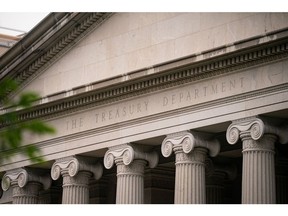
Article content
(Bloomberg) — The Treasury Department is nearing a deal that would make the so-called “revenge tax” irrelevant, the agency’s second-in-command said, a development that could bring great relief to Wall Street investors worried about punitive tax measures on foreigners.
THIS CONTENT IS RESERVED FOR SUBSCRIBERS ONLY
Subscribe now to read the latest news in your city and across Canada.
- Exclusive articles from Barbara Shecter, Joe O'Connor, Gabriel Friedman, and others.
- Daily content from Financial Times, the world's leading global business publication.
- Unlimited online access to read articles from Financial Post, National Post and 15 news sites across Canada with one account.
- National Post ePaper, an electronic replica of the print edition to view on any device, share and comment on.
- Daily puzzles, including the New York Times Crossword.
SUBSCRIBE TO UNLOCK MORE ARTICLES
Subscribe now to read the latest news in your city and across Canada.
- Exclusive articles from Barbara Shecter, Joe O'Connor, Gabriel Friedman and others.
- Daily content from Financial Times, the world's leading global business publication.
- Unlimited online access to read articles from Financial Post, National Post and 15 news sites across Canada with one account.
- National Post ePaper, an electronic replica of the print edition to view on any device, share and comment on.
- Daily puzzles, including the New York Times Crossword.
REGISTER / SIGN IN TO UNLOCK MORE ARTICLES
Create an account or sign in to continue with your reading experience.
- Access articles from across Canada with one account.
- Share your thoughts and join the conversation in the comments.
- Enjoy additional articles per month.
- Get email updates from your favourite authors.
THIS ARTICLE IS FREE TO READ REGISTER TO UNLOCK.
Create an account or sign in to continue with your reading experience.
- Access articles from across Canada with one account
- Share your thoughts and join the conversation in the comments
- Enjoy additional articles per month
- Get email updates from your favourite authors
Sign In or Create an Account
or
Article content
“We continue to have negotiations with our OECD partners and continue to hope that in the very short run we have a breakthrough that would make conversations about 899 irrelevant,” Deputy Treasury Secretary Michael Faulkender said in an interview, referring to a part of President Donald Trump’s signature tax legislation that would impose a levy on foreign companies and investors from countries that the US determines have been unfairly imposing digital taxes on American technology companies.
Article content
Article content
Article content
The Organization for Economic Co-operation and Development has been hosting global talks over corporate taxes, with some of the proposals drawing opposition from the US.
Article content
By signing up you consent to receive the above newsletter from Postmedia Network Inc.
Article content
Republicans are weighing whether to pull the revenge tax provision as it nears a deal with European nations and other countries that impose a minimum tax on multinational corporations as part of a global agreement. That accord may also include the digital services taxes that are imposed on technology firms based in the US by countries such as Canada, the UK and France.
Article content
Kevin Hassett, the director of the National Economic Council, said of the Section 899 provision earlier in the day that “maybe it doesn’t have to be in the bill.” He added that the Trump administration has been pushing US trading partners to move swiftly on deals that make the provision unnecessary.
Article content
He told Fox Business that Section 899 could be removed from the bill making its way through Congress if countries “issue policy pronouncements today or tomorrow.”
Article content
Earlier: Trade Deals Could Eliminate Need for ‘Revenge Tax’, Hassett Says
Article content
Article content
The measure has come to be known as the revenge tax because it would increase rates only for countries whose tax policies the US deems discriminatory. Critics of the measure argue that the proposal would deter foreign investment, either contravening the Trump administration’s stated goal of encouraging additional manufacturing and business activity or adding confusion and hurting the economy amid changing trade policies and a potentially worsening fiscal outlook.
Article content
Earlier in the day, Treasury officials convened a meeting with members of the National Association of Manufacturers trade group, including Kyle Taylor, a finance manager at Hydro, a Norwegian aluminum company.
Article content
Taylor told Faulkender that Section 899 “does lead to some uncertainty” when it comes the company’s investments in the US and could cost his firm an additional $2 million to $10 million a year on debt service if it is included in Trump’s “One Big Beautiful Bill Act” in its current form.
Article content
Why Trump Is Pushing for a Global ‘Revenge’ Tax: QuickTake
Article content
Jay Timmons, the president of the association, said in a statement that his organization “will continue to support targeted changes to the OBBBA’s Section 899 to ensure Treasury has the discretion it needs to achieve success in these vital negotiations, without punishing foreign-headquartered manufacturers investing in the U.S.”
Article content
Representative Ron Estes of Kansas, who wrote the Section 899 provision that was included in the House-passed version of the bill, told reporters he hoped it never goes into effect and instead convinces other countries to change their tax policy.
Article content
The giant tax measure is now being considered by the Senate, and that chamber’s rule keepers have yet to determine whether Section 899 comports with budget rules.
Article content
—With assistance from Erik Wasson and Shawn Donnan.
Article content

.jpg) 7 hours ago
1
7 hours ago
1
 English (US)
English (US)